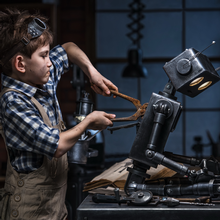Sep 02, 2021
Yvonne Nelson-Reid, PhD
YVONNE NELSON-REID, Ph.D., is the Vice President of Education and Programs at Myers & Briggs Foundation®️ (M&BF), the editor/lead writer for the People Stripes® website, a mother of 5, writer, teacher (BEd, MA), depth psychologist – Jungian and archetypal studies (MA, PhD), and career coach. Parenting, teaching in a classroom, or on the ice as a figure skating coach has taught her a great deal about relationships and the importance of communication.
View full author bio |
Close
People tend to make inaccurate assumptions about themselves when faced with a problem to solve that requires them to go outside of their natural personality type. We can all use our opposite preferences when a situation requires it, however, it might feel awkward or uncomfortable, and we may be less effective in how we use them, leading to stress and a sense of personal failure. Children may experience this at a higher rate.
In this second article of "From the Kids" series, Yvonne Nelson-Reid chronicles a moment in her daughter's journey of understanding personality type differences and the compromises needed to succeed in school.
READ MORE >>



_thumb.png)














